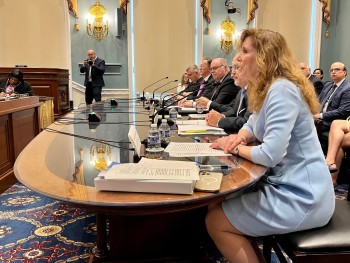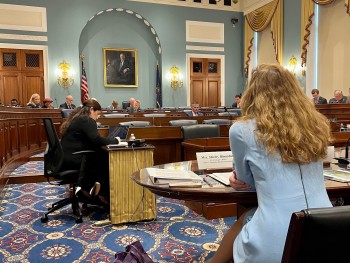On a recent wet and soggy day here in Washington, D.C., I had the distinct honor to testify before the U.S. House of Representatives Committee on Agriculture on NTCA’s broadband priorities for the 2023 Farm Bill. Those priorities include meeting the needs of consumers for decades to come by supporting high-speed symmetrical broadband networks, streamlining the permitting process and identifying eligible areas and providers to ensure that deployment funds are targeted to where they are most needed.
In the hearing, “Closing the Digital Divide in Rural America,” I had the opportunity to stress that “the minimum speed and other performance criteria for receiving federal funding must be determined by the needs of rural consumers and not set by the maximum capabilities some in the industry feel they can offer.” It feels a little bit like some non-RLEC providers are hoping to get "participation trophies" simply for showing up these days instead of building future-proofed networks. I also shared that those seeking network deployment loans and grants should be required to meet a minimum 100/100 Mbps speed threshold when delivering services in rural America.
I always welcome the opportunity to share the story of NTCA members across the country deploying cutting-edge broadband networks in deeply rural areas and their ability to deliver services that are as robust and reliable as those available in urban markets. Our member companies stand ready both to help close the digital divide in areas beyond those that they service today and to sustain their good work to date in keeping millions of rural Americans connected to the rest of the world. The U.S. Department of Agriculture’s Rural Utilities Service programs, including ReConnect, are critical tools to make that deployment happen.
The main points that I sought to make with Congress were the following:
• Build networks at 100 Mbps symmetrical.
• Ensure agency coordination is strengthened.
• Create a level playing field based on corporate structure.
• Encourage local providers with a proven track record of service to participate.
• Streamline historical preservation requirements and environmental reviews.
I found the members of Congress on this committee to be particularly engaged. They were so engaged, in fact, that the questions kept coming three hours into the hearing. The questions were excellent, and I genuinely felt the concern and angst these representatives had about ensuring that their constituents had access to services. My fellow panelists from the electric coops, satellite providers, fixed wireless industry and the cable sector were all respectful regardless of the various perspective on policies – particularly speed requirements – that we all had walking into that hearing.
I was tickled to have a colloquy with Rep. Dusty Johnson (R-S.D.), a long-time friend who made the most eloquent statement on behalf of the good work NTCA members have done historically in South Dakota. From a higher level, he even stressed how important robust broadband is to ensuring that we stay together as one connected nation. He also noted how broadband speeds and demand are expanding exponentially and that is why Congress must do better, as the Farm Bill is written to ensure that our country doesn’t fall behind on our obligations to ensure that all Americans - regardless of where they live - have access to comparable and affordable broadband. I have known the Congressman since before he had a cool lapel pin and have always found him to have the gift of combining humor with a big brain. I really appreciated his focus on symmetrical speeds and building future proof networks with the ReConnect program.
Thanks to NTCA's grassroots engagement, a number of our members were able to submit questions to their members of Congress and work with our outstanding government affairs team to ensure the important points were raised in the committee. At the end of the 210-minute hearing, I truly think that the voice of rural broadband providers was loud and clear in that hearing room. And I was thankful that the hearing ended before the microphones at the witness table were able to pick up any growling stomachs!



